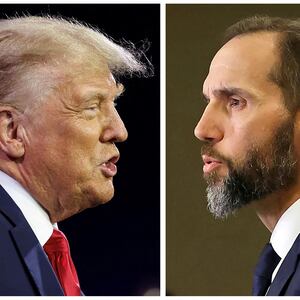Shan Wu is a former federal prosecutor who served as counsel to Attorney General Janet Reno
Some devilry may be afoot within the U.S. Justice Department as the usual aggressive pace of Special Counsel Jack Smith took an uncharacteristic time-out, asking to delay his response in the January 6 prosecution of former President Trump.
Smith, who has repeatedly emphasized the public’s need to have answers about Trump’s election interference efforts prior to the election, had been ordered by Judge Tanya Chutkan to confer with Trump’s defense lawyers to propose a schedule by Aug. 9 to be discussed at an Aug. 16 hearing. Instead, Smith filed a two-page joint status report, explaining that he needed more time to assess the effect of the U.S. Supreme Court’s presidential immunity and asked to submit another status report on Aug. 30.
Unsurprisingly, Trump’s lawyers did not oppose the delay. Judge Chutkan granted Smith’s proposal—no surprise given that both prosecution and defense were in agreement—and the new hearing date is now Sept. 5, only 60 days before the election.
Smith’s team and the Justice Department have had some 40 days to analyze how best to proceed in light of the Supreme Court’s pro-Trump ruling. While the ruling likely curtailed some of Smith’s case—such as immunizing any communications Trump might have had with DOJ no matter how corruptly intended they may have been—the main effect of the ruling was to send the case back to Judge Chutkan to sort out exactly what evidence would be permissible at trial.
Both the D.C. Circuit and Judge Chutkan moved quickly once the high court sent the case back to them with both the appeals court and trial court acting within a day of getting the case back. So it’s hard to figure out why Smith wants more time merely to propose a schedule.
Having worked in the leadership offices of DOJ, I completely know what Smith means when he references engaging in “consultation with other Department of Justice components.”
Such “components” would likely include the office of the Deputy Attorney General, the Criminal Division, the Office of Legal Counsel, the office of the Solicitor General as well as the Office of the Attorney General. The DOJ is notorious—as are many large agencies—for having constant meetings to determine positions and policies but there seems to have been plenty of time to sort this out already.
Indeed, commentator Norm Eisen, Co-Founder & Executive Chair of the State Democracy Defenders Fund, expressed great disappointment at Smith’s decision, calling it a mistake and referencing the online forum Just Security’s analysis of how much of the case survives the high court ruling. The Just Security analysis is quite compelling, and includes a color-coded annotation of Smith’s indictment. It is hard to imagine that the DOJ was not capable of producing a similar analysis in the same amount of time.

Donald Trump attends a campaign rally at the Reno-Sparks Convention Center on Dec. 17, 2023 in Reno, Nevada.
Justin Sullivan/GettyReading the tea leaves leads me to consider several explanations.
First and foremost to me is that there could be disagreement between Smith’s team wanting to move quickly and DOJ leadership (AG Merrick Garland) being concerned about moving aggressively so close to the election. One of the possible actions that could occur next would be a so-called “mini-trial” with live witnesses to determine which of Trump’s actions were truly official acts subject to immunization. Such a process—if held before the election—would very publicly remind the voters of what Trump had done and possibly reveal new and damaging information.
Given Garland’s concerns about the Justice Department being accused of being weaponized by the Biden administration (and perhaps haunted by memories of former FBI Director James Comey re-opening the Hillary Clinton email investigation days before the 2016 election) it is understandable if Garland wants a lot more “T”s crossed and “I”s dotted before proceeding.
Other possibilities include that maybe Smith plans to re-tool his indictment in a way that might make it less vulnerable, or even indict previously un-indicted co-conspirators. This is an approach that has been suggested by some commentators as putting to good use the fact that an actual trial before the election has been made impossible by how long the high court took in issuing its decision.
Independent journalist Marcy Wheeler also poses the theory that the Supreme Court decision affecting the definition of obstruction of justice under 18 U.S.C. section 1512 (c)(2) requires DOJ to analyze how that decision will affect the Trump case. That case has already resulted in delay and some re-configuring of charges against defendants charged with in what Wheeler calls the “crime scene cases”—meaning violence on the day of Jan. 6.
Jack Smith may indeed be playing a version of the “long game,” given that it’s reported that he plans to pursue the Trump cases past the election and up and until inauguration. Under this scenario—if Trump loses—this added time will have been put to good use. If Trump wins, however, it will all be moot and the country will have to live with the consequences of the Supreme Court’s delay and the time it took for Attorney General to get Special Counsel started on investigating and prosecuting Trump.






